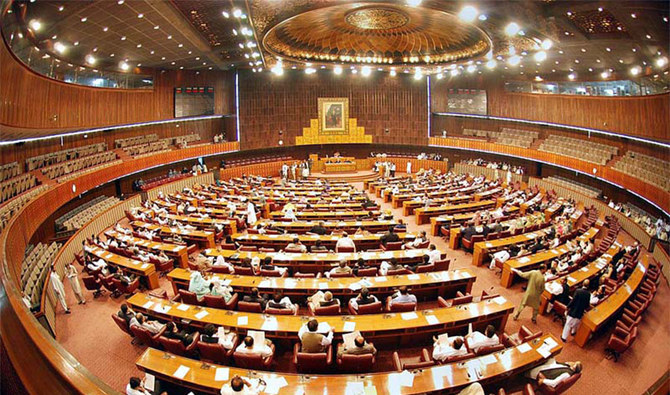Planning and Development Minister Ahsan Iqbal said on Sunday Pakistan’s defense spending would be hiked in the budget for the next fiscal year as the military would “certainly require” more financial resources to defend the country against India.
Pakistan and India attacked each other with missiles, drones and artillery earlier this month in the worst military confrontation in decades between the two nuclear-armed neighbors. The conflict erupted after an attack in April on tourists in Indian-administered Kashmir that New Delhi blamed on Pakistan. Islamabad has denied the charge.
The tensions erupted into a military confrontation on May 7 after India first hit what it said was “terrorism infrastructure” in Pakistan and Azad Kashmir with missiles, and Pakistan retaliated, saying it had downed six Indian fighter jets.
Fighting between the two nations continued for four days until a ceasefire was reached on May 10.
“Obviously, Pakistan will do anything within its reach to make its defense impregnable,” Ahsan told Arab News in a telephone interview when asked if there were plans to increase defense spending in the budget for fiscal year 2025-26, which will be unveiled on June 10.
“Our military would certainly require more financial resources to defend the country against the hegemonistic designs of Modi.”
Ahsan declined to disclose the new figures for the defense allocation.
Beijing is Pakistan’s primary supplier of military equipment. This includes more than half its 400-odd fighters, primarily the JF-17 but also the J-10C.
According to the Stockholm International Peace Research Institute (SIPRI), China has sold Pakistan $8.2 billion in arms since 2015. China was the world’s fourth-largest arms exporter from 2020-24, and Pakistan was China’s top customer. Islamabad consumed 63 percent – nearly two thirds – of Chinese weapon sales in that period.
In response to a question about media reports China was fast-tracking delivery of its advanced J-35A fifth-generation stealth fighters to Pakistan, with the first batch expected by early 2026, planning minister Ahsan said:
“Pakistan’s fighter jets have already done well against India and the country will do anything it can to make it’s defenses stronger.”
The finance ministry declined to comment on a planned hike in defense spending but an official privy to budget talks within the government and with the International Monetary Fund (IMF) said:
“We are discussing all the issues including Pakistan’s revenues and defense with the IMF but nothing has been finalized yet.”
An IMF official said the lender did not comment on any country’s defense budget.
An IMF mission led by Nathan Porter visited Pakistan last week to discuss the country’s new fiscal plan but returned without reaching an agreement.
“We will continue discussions toward agreeing over the authorities’ FY26 budget over the coming days,” the Washington-based lender said in a statement on May 24.
The media wing of the Pakistan army declined to comment on the issue immediately.
“WAR-LIKE SITUATION”
Two days after the ceasefire, Indian Prime Minister Narendra Modi warned Pakistan New Delhi would target “terrorist hideouts” across the border again if there were new attacks on India and would not be deterred by what he called Islamabad’s “nuclear blackmail.”
“In the coming days, we will measure every step of Pakistan... what kind of attitude Pakistan will adopt,” Modi said, adding that India had only “paused” strikes.
Ashfaq Tola, the chairman of Karachi-based tax and corporate advisory firm Tola Associates and an adviser to past Pakistani governments on the budget-making process, said an over 40 percent hike in the current defense budget of Rs2.122 trillion ($7.53 billion) could be expected in the new financial plan.
“Considering the ongoing situation, the country’s defense budget should stand at as much as Rs3,000 billion ($10.6 billion),” Tola said.
“In such a big conflict, you need a lot of ammunition, surveillance, border movement, border troops management. To finance all these requirements, they will have to allocate more money this time.”
In a report published on Saturday, Tola Associates proposed raising the defense budget to Rs2.8 trillion, a 32 percent increase compared to the last fiscal year, owing to a “war-like situation” with India.
“The budgeted defense expenditure stood at Rs2,122 billion for FY25 while the actual expenditure till March 2025 was Rs1,424 billion. [However], due to the ongoing war situation with the neighboring country, defense spending may increase by up to 50 percent in the Q4FY25,” the report said.
“Given the current regional tensions and the need to ensure Pakistan’s defense preparedness, we estimate total defense spending to reach Rs2.4 trillion by June 2025.”
After debt servicing, defense is the second biggest drain on Pakistan’s revenue, which the IMF, since approving a $7 billion bailout program for Islamabad last September, wants the government to increase through taxing incomes from agriculture, real estate and retail sectors in the new budget.
Pakistan’s historically large defense budget is attributed to a complex interplay of factors, primarily driven by regional security concerns and internal challenges. These include the perceived security threat from India as well as internal instability and security threats like terrorism. Additionally, debt servicing and the allocation of resources toward military interests have also played a role in shaping the budget.
In the last five years, Pakistan has increased its defense expenditures more than 60 percent to Rs 2.12 trillion ($7.53 billion), or two percent of GDP, according to data compiled by Karachi-based research firm Arif Habib Ltd.
“An increase [in defense spending] is certainly a possibility. The recent clash with India emboldened Pakistan’s military, as it has regained public goodwill and popularity that will give it the confidence to take potentially politically risky steps,” Michael Kugelman, a South Asia specialist based in Washington, told Arab News.
“That includes ramping up an already-sizable defense budget at a moment when the economy, despite some recent stabilization on the macro level, remains fragile.”
















